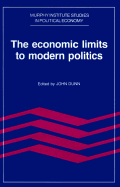Book contents
- Frontmatter
- Contents
- Preface
- List of contributors
- The economic limits to modern politics
- Introduction
- 1 The economic limits to modern politics
- 2 Free trade and the economic limits to national politics: neo-Machiavellian political economy reconsidered
- 3 The political limits to premodern economics
- 4 On some economic limits in politics
- 5 International liberalism reconsidered
- 6 Capitalism, socialism and democracy: compatibilities and contradictions
- Index
2 - Free trade and the economic limits to national politics: neo-Machiavellian political economy reconsidered
Published online by Cambridge University Press: 01 June 2011
- Frontmatter
- Contents
- Preface
- List of contributors
- The economic limits to modern politics
- Introduction
- 1 The economic limits to modern politics
- 2 Free trade and the economic limits to national politics: neo-Machiavellian political economy reconsidered
- 3 The political limits to premodern economics
- 4 On some economic limits in politics
- 5 International liberalism reconsidered
- 6 Capitalism, socialism and democracy: compatibilities and contradictions
- Index
Summary
Trade is now becoming the golden ball, for which all nations of the world are contending, and the occasion of so great partialities, that not only every nation is endeavouring to posess the trade of the whole world, but every city to draw all to itself.
Andrew Fletcher of SaltounThere are many kinds of economic limits to politics, by no means all of them distinctively a product of the “modern age.” Here we shall consider only the specific limit to politics set by the imperative need of modern nations to succeed in international trade, arguing that this particular limitation in substantial territorial states came into existence only when a number of European countries were transformed into what eighteenth-century political economists called “commercial societies.”
In the 1660s the former English ambassador William Temple, in his influential analysis of its politics and commerce, observed that Holland was then facing an entirely novel adverse situation in international markets, one which he predicted would soon put an end to the country's miraculous development. He did not advance the familiar moralistic analysis in terms of the impact of luxury and the decline this must inevitably promote. He predicted the decline of Holland not because all good things must at some point come to an end or because of the supposedly corrupting impact of increasing opulence. Rather, he insisted upon the reality of a transformation in the world trading regime which was wholly independent of the practical merits or demerits of Dutch trading policy.
- Type
- Chapter
- Information
- The Economic Limits to Modern Politics , pp. 41 - 120Publisher: Cambridge University PressPrint publication year: 1990
- 25
- Cited by



